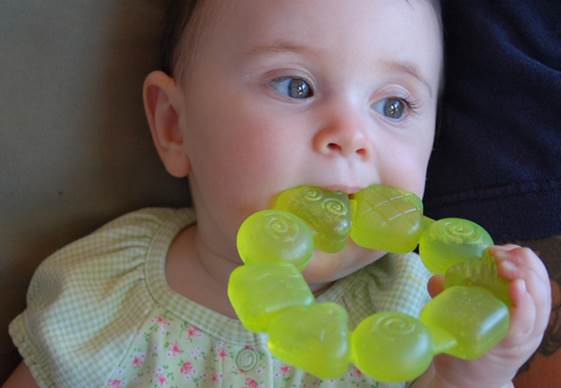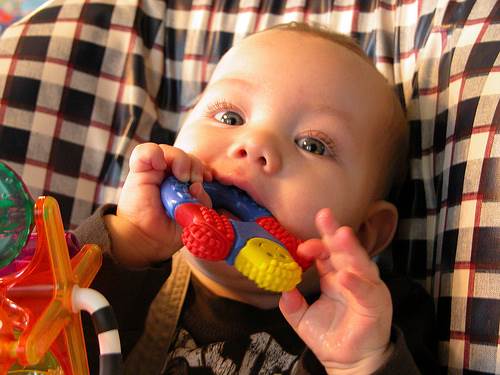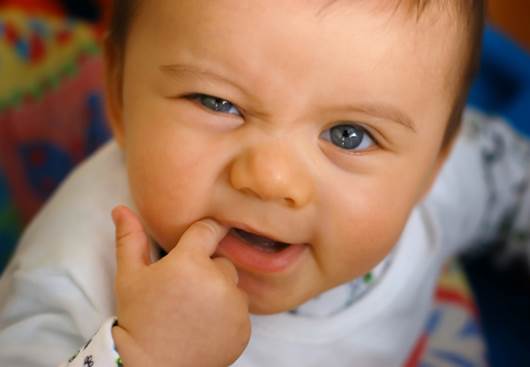Your little angel can start teething at 3
months old, or the first tooth can appear on her first birthday. No matter how
old your baby is, teething can be a painful process making her uncomfortable. Even
if you do not see a tooth that is coming out of gums, she may show symptoms for
you to know she is teething and need to be comfortable: irritable mood,
drooling and chewing everything in sight are typical signs.
Coldness
Cold things help relieve pain and discomfort
associated with teething - just like when you have sore muscles. Cold teething
rings have a variety of colors and styles to evoke the interest of your baby,
and they are safe for teething babies to chew. Please buy the teething rings
filled with water and place the ring in the freezer, freezing them can harm the
baby's gums. Put a damp washcloth in the refrigerator for 1 hour and let the
baby suck on it can also help. If the baby begins to eat solid foods, give her
frozen fruits and vegetables to chew and relieve pain.

Cold
teething rings have a variety of colors and styles to evoke the interest of
your baby
Massage
Massage your baby's gums with a clean finger.
Gently rub over the area that is causing her discomfort with a little pressure.
Use a cool washcloth to augment the analgesic effect while you are using force.
If you're not sure where her teeth are erupting in her mouth, massage the two
places she can get her first teeth.
Pressure
Your baby may not like cold things in her
mouth, but there's something to chew on can create comforting pressure. Try
teething rings or toys for the teething babies. Solid, edible foods are also
able to provide pressure, such as peeled carrots or biscuits for teething
babies.

Try
teething rings or toys for the teething babies
Distraction
Distract your baby with new toys - but you do
not need to buy new toys just because she is teething. Instead, turn around her
toy store with various toys so she does not play with the same toys every day.
If toys do not distract her, you should take her for a walk in the stroller or
visit the park to distract her from teething pain. Babies at this age are quite
easily distracted by all happening around them.
Propitiation
Your baby wants to stay close to you while she
is teething. Please help her with snuggles and closer attention. If you are
sleep training, keep your habit, but give her propitiation if she needs it at
midnight. If she likes rocking or bouncing seat, use them to cause distraction
when you can’t keep your baby.

Not
all babies have the same symptoms of teething
Things to consider
Not all babies have the same symptoms of
teething. Some children may not drool much while others drool frequently.
Please follow the common symptoms, but be aware of other things that can be
causing her discomfort. A slight fever is normal when your baby is teething,
but if she has a high fever - usually above 100.4 degrees F – is uncomfortable
or shows other symptoms (vomiting, coughing or diarrhea), contact your doctor.
Please remove bacteria buildup by wiping your baby's gums with a clean, wet
washcloth per day. Once your baby has her first tooth, wipe it using a soft
toothbrush rinsed with clean water. Your little angel does not need toothpaste
until she is enough to spit, at least 2 years.